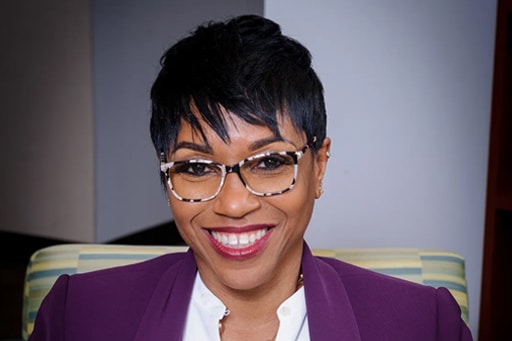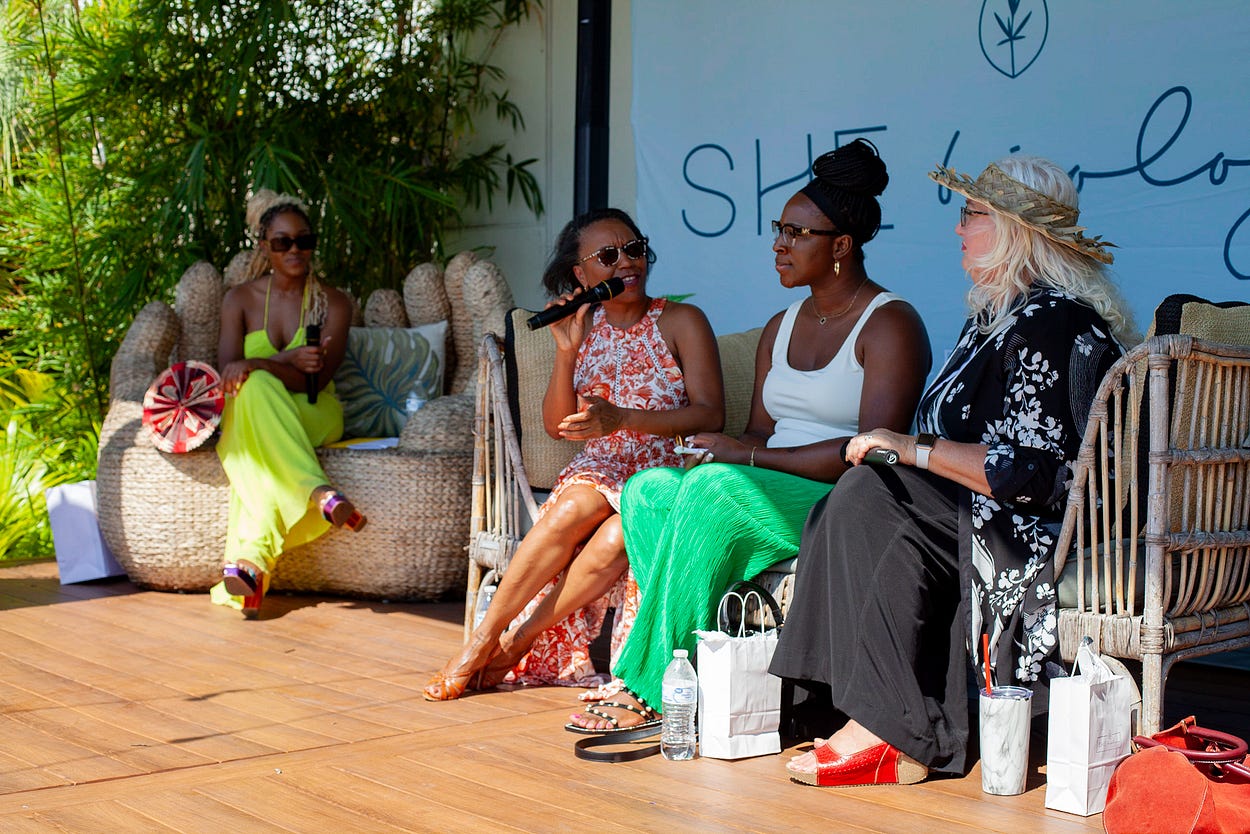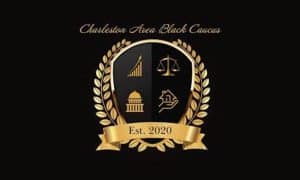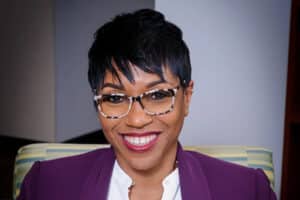Women In Wellness: Dr Jeannelle Perkins-Muhammad On The Five Lifestyle Tweaks That Will Help Support People’s Journey Towards Better Wellbeing

You do not have to have all the answers; you simply need to know where to find them.
Today, more than ever, wellness is at the forefront of societal discussions. From mental health to physical well-being, women are making significant strides in bringing about change, introducing innovative solutions, and setting new standards. Despite facing unique challenges, they break barriers, inspire communities, and are reshaping the very definition of health and wellness. In this series called women in wellness we are talking to women doctors, nurses, nutritionists, therapists, fitness trainers, researchers, health experts, coaches, and other wellness professionals to share their stories and insights. As a part of this series, we had the pleasure of interviewing Dr. Jeannelle Perkins-Muhammad.
Dr. Jeannelle Perkins-Muhammad is a highly respected psychotherapist, licensed family therapist, and accomplished author with over two decades of experience in relationship and life coaching. Her extensive background, including a Ph.D. in counselor education and supervision, has uniquely positioned her as an expert in transforming relationships, mental health, enhancing communication skills, understanding intimacy, and improving conflict resolution.
Thank you so much for joining us in this interview series! Our readers would love to “get to know you” better. Can you share your “backstory” with us?
Igrew up in the Black church. It was my safe haven. My parents were ministers and ran Marriage Excellence and the Finance ministries. They counseled couples and individuals often. Periodically someone would approach them and express their gratitude for helping save their marriage or teaching them to establish and grow wealth.
I grew up dissecting and analyzing emotions, observing people, learning to be strategic in my emotions, setting aside assumptions, and seeking reality and acceptance. I learned to formulate an action plan through the lens developing my social, moral, reputational, and financial capital.
As a young adult, I recall thinking, why didn’t more people express these sentiments and why did they return to counseling so often. What I realized then was the we cultural have an incredible grasp on spiritual connections. We will get grounded by putting our feet in the sand, hug a tree to connect with nature and even lay at the altar before God seeking guidance. These are all great spiritual practices. Yet the practical steps to communicating or demonstrating empathy or resolving conflict escape us. When I look back at this time in my life I realize that this is the space where my path was illuminated to gain greater understanding of the psychology behind relationships. I decided that it made sense to view relationships from the systemic lens of the life span. Thus, I did my Bachelors in Organizational Communication, MS in Marriage and Family Therapy/Counseling and my Ph.D. in Counselor Education and Supervision. I narrowed my focus on the African American clients living with anxiety and depression and began to study racisms impact on black intimacy.
Can you share the most interesting story that happened to you since you started your career? What were the main lessons or takeaways from that story?
As a Ph.D. candidate, I faced challenges when my dissertation on “Quantitative Study of Counselor Cultural Competence, Implicit Racial Bias, and Race” did not align with the views of my professors. It took three mentors before I found one who understood and supported my research. Her advice to shift my theoretical orientation from critical race theory to multicultural and social justice counseling competencies proved invaluable. Little did I know that a year later, the world would be embroiled in a debate around critical race theory. Despite the frustration, I learned two valuable lessons: no one can take my education away, and with the credentials I have earned, no one can dictate the kind of research I can do.
It has been said that our mistakes can be our greatest teachers. Can you share a story about a mistake you made when you were first starting? Can you tell us what lesson you learned from that?
Community impact has always been a top priority for me. As an entrepreneur, I knew I needed to focus on self-care and avoid burnout to be effective in the community. However, I was convinced by a colleague that accepting insurance would increase my impact. I spent hours applying and getting accepted to insurance panels, and even hired someone to process insurance claims. But what was most disconcerting, was that my clients who paid my cash price were making more progress than those who had a $13 or $20 co-pay. The co-payers were just not doing the work nor seeing results. Yet, they will say, “I tried therapy.”
It took me a year and a half to realize that success cannot be measured by someone else’s tools. My mother used to say, “do not let them round out your edges.” I learned to honor my purpose and plan, and that sometimes the path to impact is not what we expect. In the end, I rectified the financial damage to my business and regained my focus on making a positive impact in my community.
Let’s jump to our main focus. When it comes to health and wellness, how is the work you are doing helping to make a bigger impact in the world?
Being a licensed marriage and family therapist, I understand the intricacies a of deep intimate exchange between two people who love, adore, and desire one another but on most days can’t seem to muster the fluidity of affection to create and sustain intimate connection. In my book- Into-Me-See: Mastering Black Intimacy for the Relationship You’ve Always Wanted; games; subscriptions and in all my opportunities to speak to larger audiences, I teach couples to flourish in relationships. After having spent years helping couples resolve their intimacy mishaps and explore their intimacy needs, I am motivated to unveil the many untold truths regarding the myths and realities of intimacy between Black couples. Despite centuries of negative narratives about the intimacy of Black couples, I use these medium to reveal what sometimes limits a couple’s desire in order to actualize healthy intimacy.
Without harboring the desire to demonizing anyone, I expose unspoken truths about the challenges to healthy intimate relationships. These challenges have always been there, but because no one is willing to talk with unrelenting honesty and depths of emotion, attaining complete intimacy remains an illusion in many relationships. As James Baldwin once said, “Not everything that is faced will be changed, but nothing can be changed until it is faced.” Intimacy is a desire couples are mostly unprepared to discuss, yet one they are in desperate need to live. It is oxygen to a relationship. I hope In-To-Me-See accelerates the innate desire of Black couples toward intimacy.
Can you share your top five “lifestyle tweaks” that you believe will help support people’s journey towards better wellbeing?
1 . I have been quoted as saying “The greatest generational wealth we can bestow is mental and emotional wellness.” As entrepreneurs, investors, and property owners, we often focus on building financial wealth for our children. However, it’s equally important to build wealth in our relationships with them.
When our children are born, we have the opportunity to shape their lives and create a healthy environment for them to grow. This includes allowing them to have a voice and explore the world around them. It’s important to provide appropriate discipline and accountability while also allowing them to express emotions and discuss thoughts, even if they don’t align with our beliefs and values.
As a parent, my moral and social standards remain, but I always try to understand my children’s perspectives. By creating a safe space for my children to express themselves, I can help them develop mental and emotional wellness that will benefit them for years to come. Hopefully ensuring that they will not squander the financial privilege they gain.
2 . I created an acronym- AWAFSYST — Agree with a fool, save yourself some time. I choose to disengage from foolish arguments. It’s not about agreeing, it’s about conserving my energy for more productive conversations.
3 . What I want exists and I will not stop until it manifests! Tenacity, perseverance, endurance are key to manifestation.
4 . Before you judge me, walk 100 miles in my shoes. If you still desire to judge me, at least you are 100 miles away. Surround yourself with good people who will provide resolution without judgement, guilt or shame.
5 . I lack the fear gene. It is the only lack I will allow in my life. Fear is a choice. Moving towards what paralyzes us can be scary, but it can also lead to great opportunities. Of course, this doesn’t mean we should jump into dangerous situations like getting in a cage with a lion! Instead, it means facing our fears and taking calculated risks to achieve our goals. What’s something that has been holding you back? How can you take a step towards overcoming it today?
If you could start a movement that would bring the most amount of wellness to the most amount of people, what would that be?
Eradicate racism. African-Americans have experienced an immense amount of intergenerational trauma. Because it is ingrained in the systemic, structural, and institutional levels of America, this trauma continues to have a tremendous impact on the mental, emotional, and physical health of African Americans. It leaves us feeling frustrated, humiliated, distant, provoked, confused, eager, dismayed, shocked, sensitive, abandoned, powerless, embarrassed, betrayed, hurt, vulnerable, disappointed, appalled, horrified, unloved, hesitant and forgotten. Depression, Anxiety and suicidal ideations and completions are at an all-time high in our community. Racism greatly reduces our ability to be intimately connected through Into-Me-See. African-Americans have the highest rate of divorce at 30% Across America, the highest rate of divorce across the South- 23%, and the highest rate of divorce across the black cross religion- 19%. Eradicating racism will benefit everyone. A loss of our presence is a loss of our innovation, resilience, creativity, and leadership. We enrich the familial, cultural, social, economic, and political tapestries of the community and it is crucial to America not just for surviving, but thriving.

What are your “5 Things I Wish Someone Told Me Before I Started” and why?
- You will lose relationships the more successful you become. I would not have stifled my growth to wait for those who truly could not take the journey with me.
- Your cup should remain full- you need to service others out of the overflow. My field is one of service to others. My life used to be similar. I believe when the Bible says my cup runneth over, God intended for us to give from the external overflow as we live on the self-care of the internal contents. I think many people think it too noble to take care of everyone but themselves. We somehow have come to deem it selfish.
- Work within your circle of control. The number of things I have control over is very small and the more I focus on those, the less anxiety I experience.
- It’s necessary to compartmentalize personal life and work life. When they are enmeshed, you lose the value of self.
- You do not have to have all the answers; you simply need to know where to find them.
Sustainability, veganism, mental health, and environmental changes are big topics at the moment. Which one of these causes is dearest to you, and why?
Mental health through intimacy. What I mean is Into-Me-See — — the ability to look beyond the physicality and stereotypical characteristics that are assessed for a person and delve deeper into the intimate world of their cognitive, emotional, and spiritual being. Every encounter we have with another is a relationship. Into-Me-See allows us to connect in safety and relinquish judgement.
What is the best way for our readers to further follow your work online?




